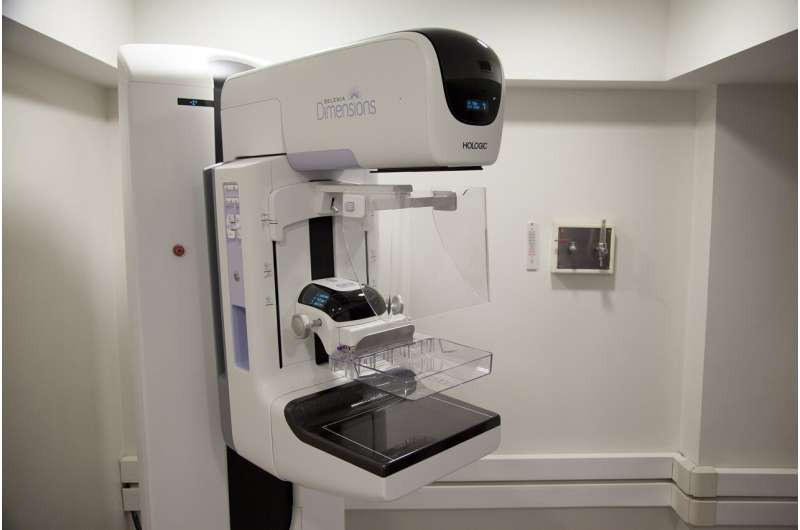This article has been reviewed according to Science X's editorial process and policies. Editors have highlighted the following attributes while ensuring the content's credibility:
fact-checked
trusted source
proofread
With cancer cases rising in young people, could earlier screenings help save lives?

Cancer cases are increasing among young people, with rising instances of colorectal cancer in people under age 55 and cervical cancer diagnoses ticking up for women ages 33 to 44, according to the American Cancer Society.
A recent ACS report shows that at least four cancers with cases on the rise are screenable, as is the case with colorectal and cervical cancers. And yet, the recommended screening age for some cancers is usually over 40.
As cases go up, we may see a shift in when people begin getting screened, according to Gary Young, director of Northeastern University's Center for Health Policy and Healthcare Research. In fact, he's said there's already calls to lower the age of colorectal cancer screenings as cases increase in young people.
"As we see an increased prevalence of cancer in people at a young age, that can lead to recommendations from some to lower the age," Young said. "(The rise in cases) is a troubling consideration and maybe at least part of the response needs to be to lower the age for screening."
But the decision to begin screenings earlier isn't as simple as it seems.
These screening guidelines come from many different sources, including government agencies and professional associations, Young said. In general, screenings before 40 are mostly limited to cervical cancer. Guidelines generally recommend most women get screened every three to five years. Women in their twenties and thirties should also check their breasts for irregularities that may indicate breast cancer while people with a family history of colon cancer may also be recommended for screening before they're 40.
By age 40 to 45, most people are recommended to begin colon cancer screening regardless of family history. The same is true for breast cancer: most women should get mammograms every year starting at 45.
The guidelines weigh factors such as the effectiveness of the screening method and whether it can be useful in catching disease in the early stages.
Professionals consider whether the diagnostic technology for a cancer can actually identify the disease in the early stages and whether the testing might yield false positives.
There can be some variety on when cancer screenings should begin. However, many indicate most screenings should begin when a person is in their 40s or 50s.
"There's no one place that is responsible for guidelines," Young said. "The general framework to the guidelines is to compare the harms and benefits that screening can result in for people at a particular age group."
This is why some are hesitant to begin cancer screenings earlier.
"We may be sending people off to more invasive diagnostic procedures that may have a non-negligible risk and can certainly provoke anxiety and worry for people," Young said. "And ultimately, there's usually some cost-effectiveness considerations that some people may think seem bloodless or cold, but the idea is thinking about the cost per saved life. We live in a world of finite resources and so … economic considerations come into that."
Young added that an increase in younger diagnoses in colorectal cancer is one where a lowering of the screening age might be beneficial, given how many more people are being diagnosed. But a critical factor is whether early diagnosis can lead to increased chance of survival.
Some young people might be able to get screenings sooner based on their family history and personal preferences. But even then, getting to appointments and affording them pose additional barriers.
For starters, Young said many insurance companies won't pay for certain screenings. And even if they do, the out-of-pocket costs can add up, said Tiffany Joseph, associate professor of sociology and international affairs at Northeastern University.
Since the Affordable Care Act was passed in 2009, insurances have covered preventative screenings for certain types of cancers, said Joseph, whose research explores the consequences of public policy on individuals. But additional screenings might not be covered the same way, placing out-of-pocket costs on the patient.
"If you have a family history and your provider is receptive to you getting those preventive screenings, you can, but there might be additional screenings that go beyond what the insurance company is going to cover," she said. "They are covering it, but the out-of-pocket cost could still be too much for some people."
Patients often need referrals for many specialists who screen for different cancers. These referrals often come from primary care physicians and there is a shortage of these types of doctors. Specialists often require months of wait time.
"There is so much demand for various types of medical services and people are just having to wait really long times to be able to get in for these screenings," Joseph said. "If it's a case where the cancer is very slow developing, that's not going to be as much of an issue. But if it's something that's a lot more aggressive, you're having to wait longer amounts of time before you can even get in for the screening. That puts you at a larger risk."
This story is republished courtesy of Northeastern Global News news.northeastern.edu.

















